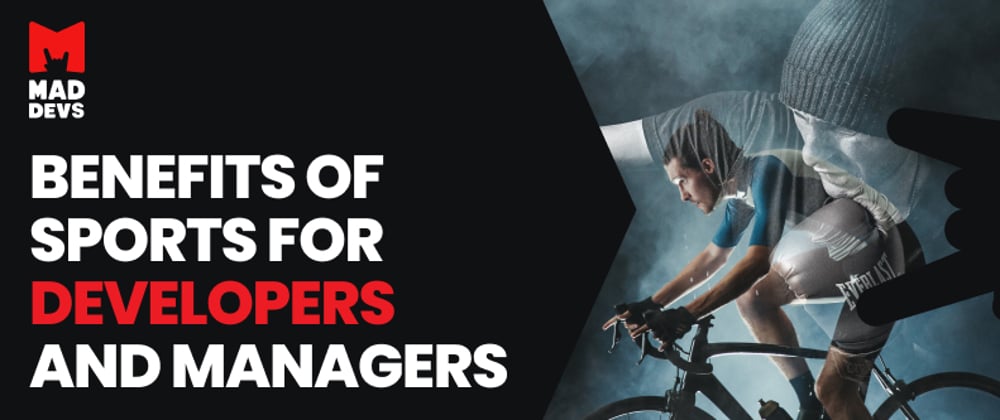After more than 10 years in different sports, I found that the experience and knowledge I gained during the training process helps me with my work.
The idea of this blog post came to me after several conversations about energy capacity and mental health with different people inside and outside of Mad Devs. I will share some of my observations and key ideas I gained from my training process. I will also explain how they help me achieve results and what lessons I learned from my journey.
My background in sports and the current routine
I started my journey in sports in 2011 with an MMA class. I was a newbie who couldn’t do anything, but after 3 years of training, I reached some results and started to feel comfortable sparring with different partners. In 2015, I began my cycling journey, and in 2019, running became one of my sports. I also tried tricking, BJJ (Brazilian Jiu-Jitsu), Muay Thai, acrobatics, climbing, hiking, walking, and a couple more types of sport.
Today, I mix cycling with running and gym with BJJ during the year using the following schedule:
- I cycle from early March until the end of the cycling season (late October usually)
- I run from early October until late February.
I continuously go to a BJJ academy and visit the gym sometimes.
Let’s discuss the benefits I gained from the training process.
A cycling training plan teaches you to manage your energy
Physical exercises are good to prevent burnout. To prevent my burnout, I cycle a lot, and usually, cycling training routines follow this training plan:
- Monday — Rest Day
- Tuesday — Interval workout (1.5h)
- Wednesday — Recovery ride (1.5–2h)
- Thursday — Interval workout (1.5h)
- Friday — Recovery ride (1.5–2h)
- Saturday — Hard and tempo workout or Race (Friendly or not) (3h)
- Sunday — Endurance miles (5h)
Interval workouts are a simple combination of high-intensity bursts with periods of rest and recovery in between. For example, you need to do 6 high-intensity intervals with a cadence of more than 100 rpm for 5 minutes with 2 minutes of rest between intervals.
Tempo or race workouts mean that you work hard for 3 hours on your maximum level of performance.
Key takeaways
I realized that you need to recover. Recovery is the most important part of any training plan. Recovery allows our body to heal itself in preparation for the next training load and decreases the risk of injuries. Usually, I try not to overperform and plan my workday with the same capacity of work. I need to recover after a hardworking mode for one or two days when I was in crunch time. I can decrease the number of issues I want to solve, or I can take a day-off.
You can’t do interval workouts daily. You’ll find that you struggle and you can’t push yourself for a couple of days. Also, you’ll find that your performance is decreased.
Rest and recovery are the most important things in cycling (actually in every sport), and it applies to work, too.
Also, I realized that I could apply my cycling training plan to my work routine and manage my energy capacity.
Besides, I’ve found that many people have difficulties with their capacity control, and we’ve invented sick days for mental health inside our company. If you need to rest, you can take one or two days off.
Discipline
Every training process makes you more disciplined. There are many words already said about discipline, and you can watch the video below.
Besides, you can watch this video.
Also, you can read the book Discipline Equals Freedom by Jocko Willink. I recommend reading the hardcover version of this book instead of reading a PDF.
Professionalism comes with discipline.
Martial arts teach you to control your emotions.
There are a lot of conflicts during the UFC weigh-ins. It’s an emotional game, and it gives us the wrong impression that you have to be angry to win. As you can see, during the fight, fighters remain calm. They control their emotions or play emotion games to find a way to make a successful punch.
My first MMA coach taught me the lesson that you must be cold-blooded during the fight. You must control your emotions, or your emotions will control you. You’ll lose the fight if your emotions control you. I spent a lot of time improving emotion control during sparring, and I found that I can do it in life. For example, one day, I found that I stayed calm while I was fixing an outage. It was good to realize that a clear mind without emotions allows seeing the situation sharp and clear.
Social and networking benefits
When you start to do any sport, you’ll meet many people, and those people can be useful for your professional network. I found and hired a couple of developers and managers from my sports network. You can find buddies in local communities or at competitions. You’ll have another interest/hobby inside your pocket as a topic for conversations.
You can use your hobby as a conversation starter or ice breaker in the following situations:
- Start a small talk with someone who shares your interests or who you have a common hobby with.
- You can find that someone on your team shares that interest, and you can increase mutual trust by talking about your common hobby.
As another benefit, you can get to know your teammates from other sides by spending time with them doing the favorite activity outside the office.
You can also find that sports can affect your leadership skills and help you define and develop them.
You’ll sleep better, but it depends
In the book Why We Sleep, Matthew Walker describes the importance of sleep and ways to achieve better sleep. In the book Discipline Equals Freedom, Jocko Willink tells how to sleep better and manage your sleep behavior.
Sports will definitely affect your sleep regime because you’ll be spending more energy during the day and you’ll need to recover. You’ll sleep better in most cases because you’re tired and you need to recover. How you sleep can be a great indicator of your current energy capacity. For instance, in the case of overtraining, I wake up during the night and have some problems with my sleep, which is an indicator for me to reduce intensity and load to prevent injuries and burnout. Yes, you can get burnout in sports, too.
Physical exercises are great for reducing stress, but they can also be a source of stress, and they can teach you to manage it.
Track your progress
The change occurs when one becomes what he is, not when he tries to become what he is not
© Arnold Beisser
From my cycling experience, I can say that you’ll see the results at the end of the season. But to see them, you need to collect the following metrics:
- Power
- Heart Rate
- Speed
- Elevation
- Distance
- Weather situation
To analyze and draw correct conclusions about your current form (that consists of the fitness level and fatigue levels), you need to collect metrics and understand the starting point. Usually, I take one workout at the beginning of a season as a starting point. Then I do a lot of work during these 6 months of training, compare the results, and see my progress.
The key idea here is to understand what you are and where you are. Define the goal (what you want to achieve), become who you want, and then track your progress to make some adjustments.
That idea is also known as The Paradoxical Theory of Change.
Takeaways
- Professionalism comes with discipline.
- Rest and recovery are the most important things. Take one or two days off to recover from the last crunch time.
- Martial arts can teach you to control your emotions.
- Sports are great for improving your professional network.
- Sports can teach you to track your progress.
- Define what you want to achieve, become who you want, and then track your progress to make some adjustments.
- The change occurs when one becomes what he is, not when he tries to become what he is not.
- Sports will improve your sleep energy control.
Previously published at maddevs.io









Top comments (0)